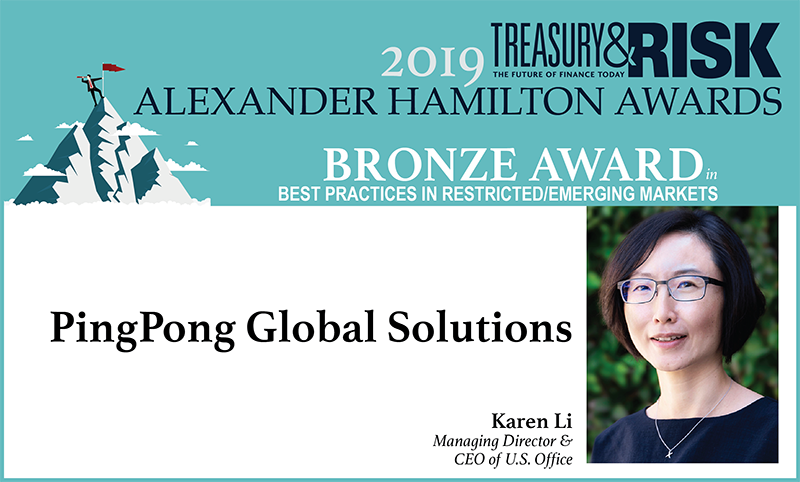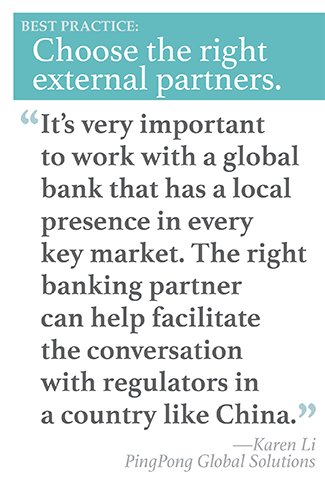
PingPong Global Solutions is a start-up financial servicescompany for the digital economy. Founded in New York City in 2015,the company provides cross-border funds transfers to support globalsales via online marketplaces by merchants based in any of 10countries, including China, India, the United States, Canada, theUnited Kingdom, and Australia.
|"Our core product is a cross-border revenue-collection servicefor e-commerce merchants," explains Karen Li, managing director/CEOof PingPong's U.S. office. "Online marketplaces that enable thirdparties to sell on their platform typically collect payment fromthe consumers, but then pay the third-party sellers in the countryand currency where the marketplace is located. We help the sellerscollect from foreign marketplaces and repatriate their funds backto their home country."
|Li offers the example of a U.S. company selling on Amazon UK:PingPong would help the American business collect what it was owed,in British pounds (GBP), then convert funds into U.S. dollars andbring them back to the United States. PingPong would also give thecompany the option to retain some of those funds in aGBP-denominated account.
|"Our customers tell us how much they want transferred back totheir home countries, and we handle those transactions," Li says."When you think about a U.S. merchant selling in the U.K., theyhave VAT [value-added tax] to pay locally," Li explains. "They mayhave other local expenses as well, like advertising, logistics, andshipping. We don't want them to transfer their funds to the U.S.and then pay those expenses from their U.S. account; that wouldrequire a double currency exchange. Instead, we give them anaccount in the U.K. from which they can make their GBP-denominatedpayments."
| The process is especially complexin markets, like China, that restrict cross-border funds transfers."When a U.S. company receives payment from a marketplace in China,they also need all the transaction details for regulatoryreporting," Li explains. Such information resides in a proprietaryenterprise resource planning (ERP) system that PingPong developedin-house. "We store all the data around our customers' transactionsin Chinese marketplaces within our ERP, for transaction monitoringas well as regulatory reporting and payment details," Li says.
The process is especially complexin markets, like China, that restrict cross-border funds transfers."When a U.S. company receives payment from a marketplace in China,they also need all the transaction details for regulatoryreporting," Li explains. Such information resides in a proprietaryenterprise resource planning (ERP) system that PingPong developedin-house. "We store all the data around our customers' transactionsin Chinese marketplaces within our ERP, for transaction monitoringas well as regulatory reporting and payment details," Li says.
To accelerate transactions for customers and increase efficiencyinternally, PingPong wanted to automate the collection of bothfunds and information from online marketplaces abroad. Thecompany's banking relationship project managers and paymentoperations groups began working together on an initiative topioneer a global account structure that would give each customer avirtual account in each currency and every country where it makessales.
|The first step was to find a global banking partner. "We neededa partner bank that could provide a global banking platform andglobal team support, as well as strong capabilities from thetechnical team to support us in creating the automation we wanted,"Li explains. "At the same time, we needed solid local capabilitiesin markets around the world. For example, in the U.S., we neededthe ability to handle local ACH payments into and out of thevirtual accounts." After evaluating their options, the PingPongteam chose to partner with Citibank.
|Together, PingPong and Citi developed the global virtual accountstructure Li's group had in mind. "It's pretty neat," she says."Within our PingPong bank account, Citi assigns a unique virtualbank account number to each merchant within each market in whichthey're selling. It works just like a regular bank account," but avirtual account is much easier for small merchants to open in aforeign country. For Li's example of a U.S. merchant wanting tosell in the U.K., she says: "We can offer them an IBAN[International Bank Account Number] that they can just enter intothe Amazon UK platform, which enables them to sell within the U.K.The merchant doesn't have to travel to the U.K. to make thishappen; the process of opening virtual accounts is very streamlinedwithin our system."
|Once a merchant is set up in the system, its staff can usePingPong's online platform to manage the amount of money in each ofits virtual accounts, and to transfer money among them or makepayments or withdrawals. "When customers log in, they see thebalance and currency of each virtual bank account we've assignedthem," Li says. "They can initiate transactions, convertcurrencies, make payments, or withdraw funds."
|The platform makes its current foreign exchange (FX) ratesclear. "Currency rates are transparent," Li says. "The merchantsknow exactly what they'll get in terms of foreign exchange, andthey have better control of when and exactly what amounts eachtransaction will be."
|
See also:
- Partnership Breeds Innovation in Funds Transfersout of India
- Automating Cash Visibility in EmergingMarkets
|
PingPong's ERP system connects to Citi's banking platformthrough an application programming interface (API). Data flows forpayments processing, remittance details, and regulatory reportinginformation are fully automated. Because PingPong has removed muchof the friction from cross-border transactions it handles, it canprocess most payments much faster now than in the past.Transactions that used to take 24 hours within certain markets nowtake only an hour or two. "We've made significant progress inhelping merchants get their money faster," Li says.
|Navigating the rules for moving money into China is an ongoingchallenge. "Over the four years that we've been operating, theregulations around FX and reporting for e-commerce merchants havechanged multiple times," Li says. "We have worked hard to build andmaintain good relationships with the People's Bank of China [PBOC]and State Administration of Foreign Exchange [SAFE]. Our complianceteam is very proactive in staying ahead of any upcoming changes,making sure the PBOC and SAFE are aware of exactly how our productworks, and then submitting the documents required to keep ourcustomers compliant."
|She credits Citi with helping PingPong build theserelationships. "I think the biggest lesson we've learned from thisprocess is that it's very important to work with a global bank thathas a local presence in every key market," Li says. "The rightbanking partner can help facilitate the conversation withregulators in a country like China."
|
Complete your profile to continue reading and get FREE access to Treasury & Risk, part of your ALM digital membership.
Your access to unlimited Treasury & Risk content isn’t changing.
Once you are an ALM digital member, you’ll receive:
- Critical Treasury & Risk information including in-depth analysis of treasury and finance best practices, case studies with corporate innovators, informative newsletters, educational webcasts and videos, and resources from industry leaders.
- Exclusive discounts on ALM and Treasury & Risk events.
- Access to other award-winning ALM websites including PropertyCasualty360.com and Law.com.
*May exclude premium content
Already have an account? Sign In
© 2024 ALM Global, LLC, All Rights Reserved. Request academic re-use from www.copyright.com. All other uses, submit a request to [email protected]. For more information visit Asset & Logo Licensing.







